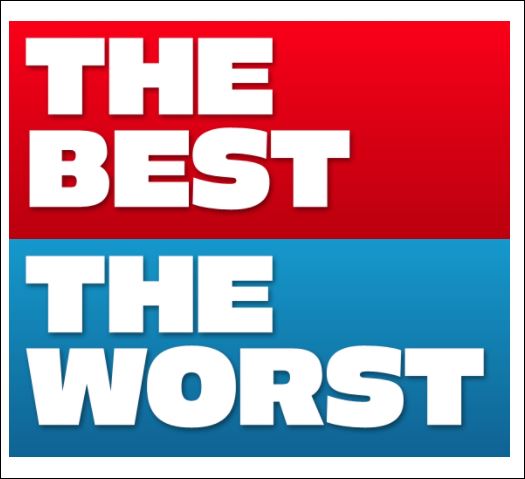Biggest hits and misses for April 2018.
By Alexander Russo
Three days into May and April already seems like it ended long ago. But April was a busy, busy month, full of education reporting highs and lows. Let’s take a look back at the best and worst before we forget.
Follow @thegrade_ to learn more about media coverage of education issues. Sign up for the newsletter here.

👍 OWNING THE STORY: NY1’s Lindsey Christ wasn’t the only reporter at a recent Upper West Side (NYC) school meeting that got heated, but she had the dramatic video portraying upset parents and a defiant principal that proved indispensable. If you haven’t seen it already, go here: Student diversity push upsets some parents at UWS school. Schools are intense places, I keep telling everyone. Video journalism like this conveys that intensity as well or better than anything else.
👍 AWARDS GALORE: Spring awards season is upon us.Congrats to current and former BaltSun reporters Liz Bowie and Erica Green for winning first place in the education writing category of the National Headliner Award. Some great education news coverage is also featured among this year’s Society of Professional Journalists awards, including the AP’s big series, “Schoolhouse sex assault.” Congrats to everyone involved in “Big Buses, Bigger Problems” a NBC5/KXAS-TV (Dallas-Fort Worth) investigation, which just won a Peabody. Big congrats to Zahira Torres and the entire newsroom on the occasion of the El Paso Times winning a top award for its investigative report on a shady El Paso Independent School District contract. Congrats to all the IRE finalists and category winners but especially to WTVF Nashville (for “Toxic School Water”), WBEZ Chicago (for “Chicago Public Schools Secretly Overhauled Special Education at Students’ Expense”), and Oregon Public Broadcasting (for “Chemawa Indian School Investigation”). And of course, the annual EWA awards included some amazing finalists this year, such as VICE’s searing eight-part series “Last Chance High” and Linda Lutton’s hour-long audio documentary “The View from Room 205.”
👍 DID THE SCHOOL BETRAY THE STUDENT? ProPublica’s A Betrayal, featuring an immigrant high school student and the Long Island school that unintentionally put ICE on his trail, “is quite possibly the best piece of journalism I’ve ever read,” gushed the NYT’s Erica Green. “The reporting was insanely detailed, and the writing was flawless.” Contributor Kristen Doerer interviewed ProPublica reporter Hannah Dreier about lessons for education reporters when reporting about vulnerable subjects in communities that have been burned by bad press coverage in the past.
👍 MUSLIM TEACHER BULLYING: One of the best pieces of the month was Leila Fadel’s NPR segment, Turning rampant anti-Muslim bullying into teachable moments, which describes how a Muslim family near San Jose “pushed back against bullying and intimidation, at school and the local political arena.” It’s a feel-good piece, sure, but with a pragmatic sensibility. It’s holistic, describing the experiences of a Muslim student and a teacher who have been bullied at school. None of the story subjects are presented as victims. There’s nuance. And it’s a story that lots of other education reporters and outlets might emulate.
👍 SPRING FAVORITES: There are scads of great education writers and teams out there, and they don’t really get as much appreciation as they should. That’s why we pulled together a list of favorite education bylines, teams, and outlets for Spring 2018. The roundup includes six journalists writing for local or regional outlets, eight reporting for national outlets, and five education teams or outlets — each with an example of some of their best work. Three favorites that may surprise you: CALmatters’ Jessica Calefati. The NYT’s Emily Badger. Teen Vogue.
👍 PROFICIENT NAEP 2018 COVERAGE: Breath a sigh of relief. News accounts of this year’s NAEP scores didn’t generate the usual howls and ridicule from education insiders. “I’ve been following this event for years,” wrote Tom Loveless, formerly of the Brookings Institute. “By this time of night, I’d normally see 4-5 ridiculous false causal claims in reporting the scores. Kudos to today’s press for careful reporting!”
👍 QUICK CORRECTION: Kudos to John Woodrow Cox and Steven Rich for producing a lovely new piece about the number of kids who’ve been exposed to school gun violence since Columbine, and for considering my feedback that the story would be stronger if it gave readers some context (ie, a denominator) rather than just the raw number. (The sentence they added? “School shootings remain rare, and only a tiny percentage of the tens of millions of students in America ever experience them.”) Alas, Vox and EdWeek were among those who wrote up the Pew survey results on fears of school shootings but neglected to note that such events are relatively rare.
👍 TAKING NEWSROOM DIVERSITY (MORE) SERIOUSLY: Kudos to EWA for attempting to address newsroom diversity more seriously at its 71st National Seminar in LA this year. Two years ago, there was a lot of unwarranted self-congratulation over survey results. Last year, journalists interested in addressing the issue were left to their own devices, by and large. This year, there’s a keynote about newsroom diversity on the first day, featuring The Root’s Danielle Belton, AP’s Jesse Holland, and EdWeek’s Francisco Vara-Orta.
👍 NEW ERA AT THE ATLANTIC: It’s not entirely clear what’s going to happen to The Atlantic’s education page now that Laurene Powell Jobs and the Emerson Collective have taken over, but the magazine hasn’t seemed to have been dramatically changed in terms of its editorial point of view, and it has hired Adam Harris to write about higher education. These are all good things. We wrote up the changes going on over there in a piece called What’s next for The Atlantic’s education coverage?.
👍 BOOK PROJECTS: Reporter Alex Nazarian is working on a book on school integration and resegregation with Rucker C. Johnson, a labor economist at Berkeley, slated for 2019. You may recall his recent Newsweek feature on school segregation, which was featured at Longreads. The Washington Post’s John Woodrow Cox tweets that he’s writing a book that “will expand on my series about children and gun violence… I am equal parts thrilled and terrified.” Anyone else out there working on an education book? Besides Nikole Hannah-Jones, I mean :-).
👍 BEFORE THEY WERE FAMOUS: Click here and here to find out some interesting tidbits about what some education reporters did before they were education reporters and gawk at the amusing photographs.
Follow @thegrade_ to learn more about media coverage of education issues. Sign up for the newsletter here.

👎 PAY NO ATTENTION TO GOOD NEWS: You might never have seen this reported, but in the time since NCLB was passed, we’ve reduced racial achievement gaps by 13 to 25 percent, according to the liberal-leaning Brookings Institute. Some states have made large strides in narrowing these gaps. The gaps that remain represent roughly one-and-a-half years of normal academic progress. “The progress on racial achievement gaps were pieces of good news that didn’t get much attention,” notes Brookings’ Michael Hansen, who authored the piece. Why is that? What do education reporters have against good news?
👎 THE BROKEN EWA AWARDS PROCESS: For all the good work it does surfacing education journalism that may otherwise go unrecognized, this year and previous years show that the awards process struggles to include some of the most obvious hits and successes that have been produced. This year, for example, the list of finalists doesn’t include NPR/EdWeek’s “Raising Kings,” or NPR’s deep look into school choice and vouchers. Last year, the finalists list didn’t include work that had been recognized by the Pulitzers. For what’s gone wrong — and how to fix it — check out this April column, Hits and misses from the EWA awards finalists.
👎 INADEQUATE TEACHER WALKOUT COVERAGE: National coverage of the Oklahoma teachers walkout was strong, in terms of quantity, but there were several key criticisms laid out against it. Among the most compelling: Coverage focused too much on the partisan political storyline than seemed warranted, according to some of those close to the action. It tended to diminish the voices of nonwhite voices who were a big part of getting the protests going. And it generally downplayed the reality that the protest failed to generate additional funding for schools after the first week (and the protesters were fighting amongst themselves). Read all about it here: Oklahoma teacher walkout coverage marred by an exaggerated focus on partisan politics. Ask yourself if you’re getting the whole story when you read teacher walkout coverage.
👎 NEWSROOM INEQUALITY: The LA Times Guild published a report on the salaries and demographics of the LA Times, and the findings include a $30,000 gap between the median salary of white men and non-white women. In addition, just 14 percent of the newsroom is Latino in a county that is 48 percent Latino. Also in April, three WBEZ Chicago reporters including education reporter Linda Lutton discussed “what changes they believe must take place to improve diversity, inclusion, and fairness in newsrooms, both in Chicago and across America.” One big issue to consider for education journalism: Black journalists are less likely today to subscribe to the notion that they have a responsibility to report on black communities, writes Richard Prince. Meantime, Chalkbeat and WBEZ’s education team recently added staff and reported upticks in newsroom diversity. Let’s hope more outlets follow suit. Stay tuned for The Grade’s annual newsroom diversity story in the coming weeks.
👎 FAKE SOURCES LEAVES EGG ON EVERYONE’S FACE: The Chronicle broke the story of Drew Cloud, a fake expert source who’d been quoted by numerous outlets. According to the NPR version of the story, news sites such as The Boston Globe, Fox News and Inside Higher Ed quoted the fictitious source … The Washington Post also quoted Cloud, though it removed references to him following The Chronicle article.” As EWA’s Kim Clark noted, “Every single outlet that quoted ‘Drew Cloud’ should post and publish corrections. And use this as a spark to reinvigorate actual reporting as opposed to copying and pasting press releases.”
👎 NYT “LEARNING” SECTION FAIL: The Times unveiled its new Learning section with a piece about online testing that includes some claims that seemed off, according to knowledgeable folks like Stephen Sawchuk (at EdWeek). The contributor who wrote the piece was kind enough to respond to these concerns but unwilling to concede that her piece included mischaracterizations of NCLB and the Common Core.
That’s it. Thanks for reading.
Every month, The Grade publishes a roundup of the best and worst education journalism of the month. For the most recent edition: Best & worst education journalism of March 2018.
Every week, The Grade produces a column delving deeply into an issue important to education journalism. For a look back at the April columns:
Hits and misses from the EWA awards finalists (2017)
The Grade’s favorite education bylines, teams, and outlets for Spring 2018
What’s next for The Atlantic’s education coverage?
Each week, The Grade also publishes a roundup of the best education journalism from which many of the above items have been taken. Recent examples:
School shooting protests, teacher walkout coverage, & all sorts of media tidbits
Teacher walkout coverage, Spring favorites, & steady reporting on NAEP 2018 scores
Striking teachers, scrutinizing The Atlantic’s education coverage, & so many media controversies
If you want to receive the weekly email in your inbox every Friday, sign up here. It’s free!
ABOUT THE AUTHOR

Alexander Russo
Alexander Russo is founder and editor of The Grade, an award-winning effort to help improve media coverage of education issues. He’s also a Spencer Education Journalism Fellowship winner and a book author. You can reach him at @alexanderrusso.
Visit their website at: https://the-grade.org/













